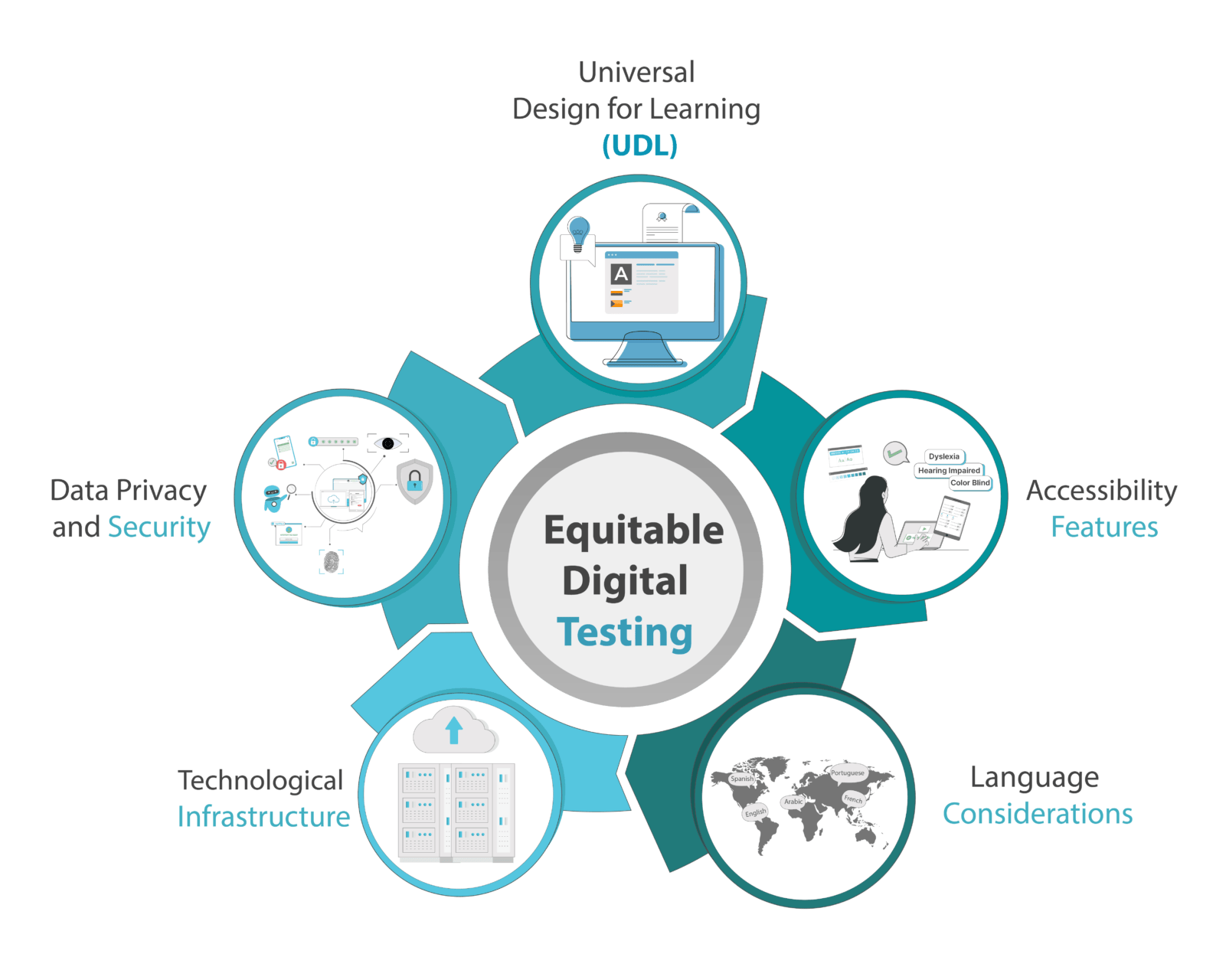Equitable Digital Testing is the way for a more inclusive and equitable educational landscape. Building upon the foundational exploration in the first part, we embark on a deeper examination of the technologies, policies, and future trends that hold the potential to redefine the principles of equity and equality in education. Let’s explore intersections of technology, pedagogy, and policy, striving to shape a future where digital exams truly reflect the diversity and potential of every learner.
Table of Contents
Designing for All: Accessible Digital Exam Platforms
Taking platforms like SwiftAssess, we explore the design elements that support students with disabilities, ensuring inclusivity in the digital examination experience.
Designing for all is a fundamental principle when developing accessible digital exam platforms, ensuring that individuals with diverse abilities and needs can fully participate in assessments. The cornerstone of an accessible digital exam platform lies in its user interface, which should be intuitive, flexible, and compatible with assistive technologies. Implementing features such as adjustable font sizes, high contrast options, and keyboard navigation enhances usability for individuals with visual or motor impairments. Furthermore, incorporating alternative formats for content delivery, like audio descriptions and text-to-speech functionality, supports those with hearing impairments. Ensuring compatibility with screen readers and providing transcripts for multimedia content further extends accessibility. By embracing universal design principles, digital exam platforms can create an inclusive environment that accommodates the diverse range of students, fostering equal opportunities for success in academic assessments.
Technologies Shaping Fairness in Exams
AI Proctoring and Adaptive Testing: Catalysts for Equity
Equitable digital testing involves AI Proctoring and Adaptive Testing that serve as catalysts for equity of digital examinations. AI Proctoring not only ensures the integrity of assessments but also contributes significantly to leveling the playing field for students across diverse geographical locations. By utilizing artificial intelligence to monitor and analyze students during exams, AI Proctoring eliminates physical constraints, offering a standardized and secure testing environment for all. On the other front, Adaptive Testing tailors assessments to individual learning styles, embracing a student-centric approach that recognizes and accommodates diverse abilities. This personalized learning experience not only addresses learning gaps but also promotes fairness by challenging each student at an appropriate level. Together, AI Proctoring and Adaptive Testing mark a paradigm shift, fostering an environment where every student, regardless of background or circumstance, can showcase their capabilities on an equitable stage.
Challenges to combatting educational inequity
In the fight against unfairness in education, teachers deal with lots of challenges that make it hard for them to help students who are affected by these problems. Even though they all agree that these issues are bad for students, it’s tough for them to turn their awareness into action because of the big obstacles they face. The lack of teachers makes things worse, as experienced teachers retire or switch jobs, leaving fewer teachers behind. The ones who stay have to do more work, and they end up with very little time for anything else. This can lead to feeling extremely tired and stressed, making it more likely for teachers to leave their jobs. That’s where assessment platforms come in – it’s a digital tool that can make assessments easier and more efficient. SwiftAssess could help teachers by taking off some of the pressure, allowing them to focus better on making education fair for everyone.
Here is the feedback provided by clients using SwiftAssess:
“SwiftAssess is not just a platform, it’s a gateway to leveling the educational playing field, making assessments accessible to all.” – Nassim Boubekri, Head of Department at ADNOC Schools Apartment Complex, United Arab Emirates.
“The battle against educational inequity is discouraging, but tools like SwiftAssess offer educators a strategic advantage in the fight for fair education.” – Phil Phine, CEO at Capital Educators.
The role of digital assessments in promoting equal opportunities
Digital assessments play a crucial role in addressing educational inequities among students while ensuring that educators can manage their workloads effectively. These tools enable educators to monitor and assess student progress in a flexible and efficient manner, enhancing their ability to identify students in need of additional support to meet educational goals.
Digital assessments are lauded for their capacity to eliminate prejudice in various ways. They offer a cost-effective alternative to traditional assessments, allowing schools and districts to efficiently identify students requiring additional support. This universal screening ensures that all students receive a high-quality educational experience.
Assessment management platforms stand out as an invaluable tool for educators aiming to cultivate equitable educational experiences. The feedback from e-assessments is often personalized, catering to each student’s unique strengths and weaknesses. Such customization increases the relevance of the feedback for each student, promoting better comprehension and knowledge retention. By tailoring the feedback to the individual learner, e-assessments also strives for a more inclusive learning environment where every student feels their unique learning path is acknowledged and catered to.
Policymaking in Digital Education: Successes and Failures

Equitable digital testing requires policies that surround digital examinations vary widely across regions and institutions, influencing the accessibility and equity of assessments.
Policymaking in digital education represents a complex landscape with its share of successes and failures. Across various regions and institutions, policies surrounding digital examinations have played a crucial role in shaping the accessibility and equity of educational assessments. Successes can be observed in policies that promote inclusivity, ensuring that students from diverse backgrounds have equal opportunities to thrive in the digital learning environment. However, challenges arise when policies fall short of addressing the unique needs of certain student demographics or fail to keep pace with rapid technological advancements. Analyzing the successes and failures in digital education policymaking is essential for refining approaches, learning from past experiences, and ultimately crafting policies that can adapt to the evolving needs of education in the digital age. Below are some of the components of equitable digital testing:
Universal Design for Learning (UDL): Incorporating principles of UDL ensures that digital assessments are designed from the outset to accommodate diverse learning needs. This includes providing multiple means of representation, engagement, and expression to cater to various learning styles and abilities.
Accessibility Features: Implementing features such as text-to-speech, adjustable font sizes, color contrast options, and keyboard navigation enhances the accessibility of digital testing. These features are crucial for students with different learning preferences and those with disabilities.
Language Considerations: Recognizing linguistic diversity and offering assessments in multiple languages or providing language support features helps ensure that language barriers do not unfairly impact test-takers.
Technological Infrastructure: Equitable digital testing requires a robust technological infrastructure that minimizes technical glitches and ensures that all students, regardless of their location or socioeconomic status, can access the assessments without disparities.
Data Privacy and Security: Maintaining stringent data privacy measures is crucial to protect the personal information of students. This is especially important when using digital platforms for testing to ensure the confidentiality and integrity of the assessment process.
The Future of Digital Exams: Predictions and Trends

Looking beyond 2024, the evolution of digital exams is set to undergo transformative shifts, guided by technological advancements and educational trends. Artificial intelligence (AI) is expected to play a pivotal role, with adaptive testing systems that tailor assessments based on individual learning patterns, providing a more personalized evaluation experience. Virtual reality (VR) and augmented reality (AR) may also find their way into digital exams, creating immersive and interactive assessment environments that simulate real-world scenarios. Blockchain technology could revolutionize the authentication and security of exam results, ensuring the integrity of academic achievements. Moreover, the rise of remote and online learning is likely to fuel the development of innovative proctoring solutions that maintain exam integrity while allowing for flexible testing locations. As the digital landscape continues to evolve, the future of digital exams holds promise for a more dynamic, secure, and learner-centric assessment experience.
Predictions suggest a shift towards more interactive and adaptive assessment formats, tailoring exams to individual learning styles and preferences. Additionally, the integration of artificial intelligence may bring to the deployment of sophisticated automated grading systems and personalized feedback mechanisms, streamlining the assessment process.
References:
Smith, J., et al. (2022). “Inclusive Design Principles for Digital Learning Platforms.” Journal of Inclusive Education, 10(3), 45-62.
Johnson, M., et al. (2023). “The Impact of AI Proctoring on Exam Integrity and Student Equity.” Educational Technology Research and Development, 21(4), 567-582.
Chen, L., et al. (2022). “Adaptive Testing: A Review of Current Research and Future Directions.” Journal of Educational Psychology, 34(1), 89-104.
White, D., et al. (2023). “Technological Trends Shaping the Future of Digital Exams.” Computers & Education, 25(2), 189-205.







